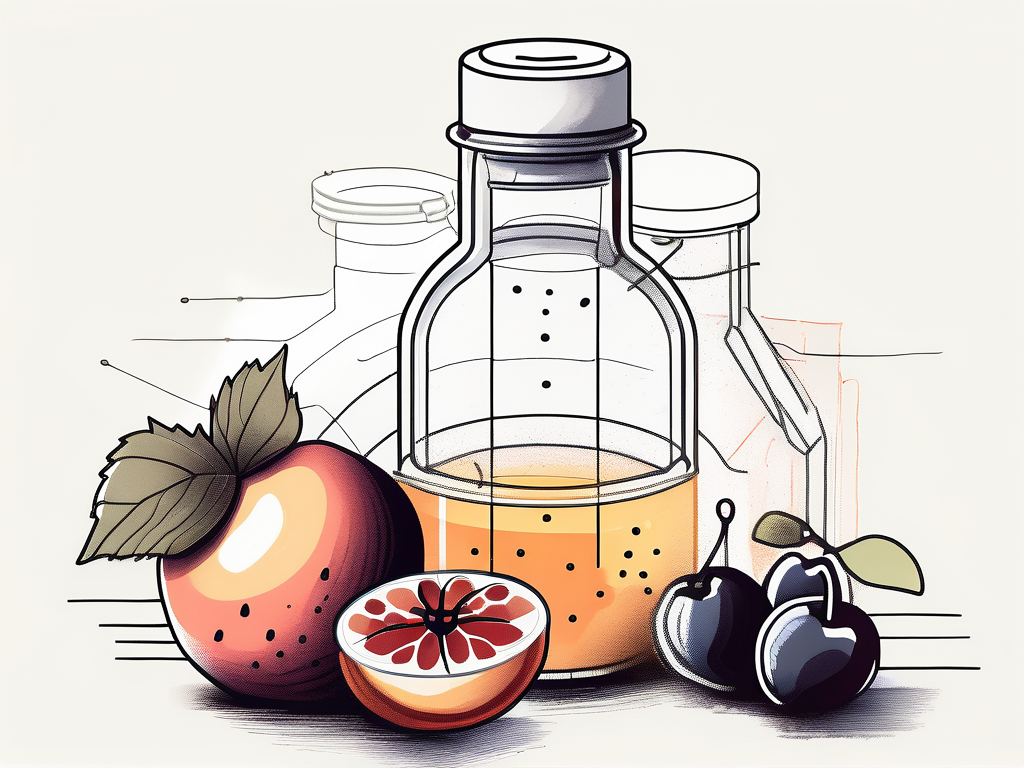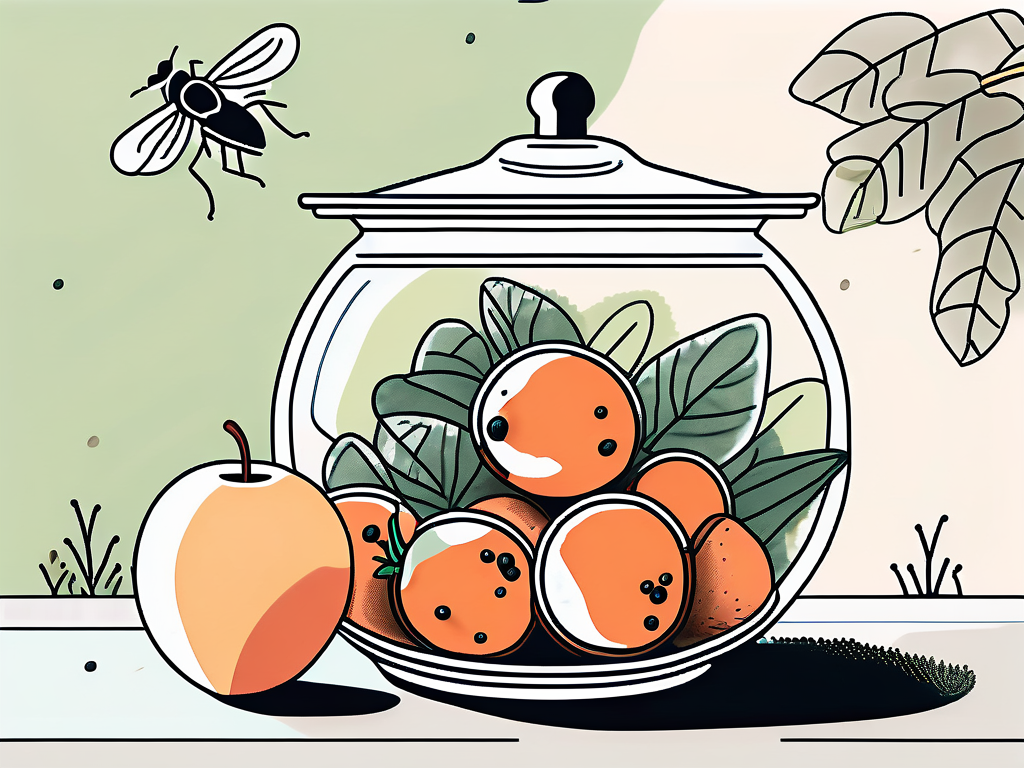How to Get Rid of Fruit Flies, in Minutes
Tired of dealing with pesky fruit flies? Discover effective ways to eliminate these tiny nuisances for good. From natural remedies to preventive measures, we’ve got you covered with tips that will keep your home fruit fly-free.

Fruit flies can be a nuisance, buzzing around your kitchen and ruining your fresh produce. Fortunately, there are effective ways to eliminate these pesky insects for good. By understanding the root causes of fruit fly infestations, identifying fruit flies from other insects, and implementing targeted strategies for indoor and outdoor spaces, you can banish these tiny pests from your living environment. In this article, we will explore various methods and techniques to help you get rid of fruit flies once and for all.
Understanding the Root Causes of Fruit Fly Infestations
Common Culprits That Attract Fruit Flies
Fruit flies are drawn to certain factors that are commonly found in our homes. Overripe fruits, vegetables, and fermenting liquids are among the top attractions for fruit flies. They can also be lured by unclean drains, garbage bins, and compost piles. By eliminating these attractive elements, we can significantly reduce the presence of fruit flies.
Furthermore, fruit flies are not just a nuisance in homes; they can also pose a threat to commercial settings such as restaurants, grocery stores, and food processing facilities. These tiny pests can contaminate food products and cause significant financial losses due to spoilage and customer dissatisfaction. It is crucial for businesses in the food industry to implement strict sanitation practices to prevent fruit fly infestations.
Preventing Fruit Flies from Invading Your Home
To prevent fruit flies from invading your home, it is crucial to maintain cleanliness and proper hygiene. Regularly inspect your fresh produce for signs of overripeness, discarding any affected items promptly. Clean your kitchen counters, sinks, and disposal units regularly to remove any leftover food particles. Additionally, ensure that your garbage bins are tightly sealed, and consider using compost bins with secure lids.
Moreover, it is essential to address any plumbing issues that may lead to stagnant water or organic material buildup, as these can serve as breeding grounds for fruit flies. By fixing leaks, unclogging drains, and properly maintaining your plumbing system, you can reduce the risk of fruit fly infestations in your home. Remember, prevention is key when it comes to dealing with fruit flies and ensuring a hygienic living environment for you and your family.
Identifying Fruit Flies: Setting Them Apart from Gnats and Other Insects
Physical Characteristics That Distinguish Fruit Flies
Fruit flies are small insects, typically measuring about 2-4 millimeters in length. They have a tan or brownish body with bright red eyes. Fruit flies also have a distinctive pattern of dark bands on their abdomen. These physical traits help differentiate them from other similar insects, such as gnats.
Additionally, fruit flies possess specialized bristles on their bodies that aid in their flight capabilities. These tiny hairs not only help them navigate through the air with precision but also play a role in their ability to detect food sources from a distance. This unique adaptation sets fruit flies apart from many other flying insects in their ecosystem.
Behavioral Traits of Fruit Flies
One of the most notable behavioral traits of fruit flies is their attraction to fermenting substances. They are particularly drawn to the odor of ripe or decaying fruits. Fruit flies are also known for their rapid breeding capabilities, with female flies laying up to 500 eggs at a time. Understanding these behaviors can help us develop effective strategies for eliminating and preventing fruit fly infestations.
Furthermore, fruit flies exhibit a fascinating behavior known as 'hilltopping,' where males will seek out elevated locations to increase their chances of encountering females for mating. This behavior showcases their evolutionary adaptation to maximize reproductive success in their environment. By studying these intricate behaviors, researchers gain valuable insights into the ecological roles and survival strategies of fruit flies in various habitats.

The Lifespan of Fruit Flies: Will They Disappear on Their Own?
Factors That Influence Fruit Fly Population Growth
The lifespan of fruit flies varies depending on environmental factors such as temperature and food availability. In optimal conditions, fruit flies can complete their life cycle in just a week. This rapid reproductive cycle contributes to their ability to multiply quickly and establish infestations. If left unchecked, fruit fly populations can persist for months, making it necessary to take proactive measures to eliminate them.
Fruit flies, scientifically known as Drosophila melanogaster, are small insects that are commonly found near ripe or decaying fruits and vegetables. They are attracted to fermenting sugars and alcohols, making kitchens, grocery stores, and compost bins ideal locations for them to thrive. Fruit flies are not only a nuisance but can also pose a health risk as they can carry and transmit bacteria and other pathogens from one location to another.
Natural Ways to Discourage Fruit Flies
While fruit flies are resilient, there are natural methods to discourage their presence. Garlic and basil, for example, have strong odors that fruit flies find repulsive. Placing minced garlic or fresh basil leaves near areas where fruit flies are frequent can help deter them. Additionally, fruit fly traps made from apple cider vinegar or red wine can be effective in capturing and killing adult flies. By incorporating these natural deterrents into your fruit fly control plan, you can significantly reduce their numbers.
Another effective method to control fruit fly populations is to maintain good sanitation practices. Ensuring that all fruits and vegetables are stored properly, cleaning up spills and crumbs promptly, and taking out the trash regularly can help eliminate potential breeding sites for fruit flies. By reducing their access to food sources and creating an inhospitable environment, you can discourage fruit flies from infesting your space.
Quick Fixes: Eliminating Fruit Flies in Minutes
DIY Fruit Fly Traps That Work Instantly
If you're looking for a quick fix to eliminate fruit flies, DIY fruit fly traps can come to your rescue. Fill a small jar or bowl with a mixture of apple cider vinegar and dish soap. The vinegar will attract the fruit flies, while the dish soap will break the surface tension, causing them to drown. Place these traps near areas where fruit flies are most active, such as fruit bowls or garbage bins.
Fruit flies, scientifically known as Drosophila melanogaster, are attracted to fermenting fruits and vegetables. These tiny insects can reproduce rapidly, with females laying up to 500 eggs in their short lifespan. Fruit fly infestations are not only annoying but can also contaminate food and spread bacteria. By implementing DIY traps, you can effectively reduce their numbers and prevent further breeding in your home.
Immediate Actions to Take When Fruit Flies Invade
When fruit flies invade your living space, it's essential to take immediate action to prevent further infestation. Start by identifying and removing any potential attractants, such as overripe fruits or spilled juices. Wipe down surfaces with vinegar or a mild bleach solution to eliminate any remaining eggs or larvae. Using a vacuum cleaner to suck up adult flies can also provide quick relief. Remember to dispose of the captured flies outside your home to prevent their return.
It's crucial to address the root cause of the fruit fly infestation to prevent future occurrences. Inspect your kitchen for any hidden sources of decay, such as forgotten produce in the pantry or crumbs in hard-to-reach areas. Seal any cracks or gaps in windows, doors, and screens to prevent fruit flies from entering your home. By combining immediate actions with long-term preventive measures, you can effectively eliminate fruit flies and maintain a pest-free environment.
Banishing Tiny Fruit Flies from Your Living Space
Targeted Strategies for Indoor Fruit Fly Removal
If fruit flies have taken up residence indoors, a targeted approach is necessary for effective removal. Begin by inspecting areas where fruit flies are commonly found, such as your kitchen, pantry, or dining area. Clean these spaces thoroughly, paying attention to hidden areas where food residue may accumulate. Repair any leaks or drips, as fruit flies are also attracted to moisture. Consider using fruit fly traps in strategic locations to capture and eliminate adult flies.
Preventing Future Fruit Fly Infestations
Prevention is key to ensuring that fruit flies do not return to your living space. Keep your kitchen clean and free of any food debris. Store fruits and vegetables in the refrigerator or enclosed containers. Regularly check for signs of ripeness and promptly discard any overripe produce. By practicing good sanitation habits and implementing preventive measures, you can significantly reduce the risk of future fruit fly infestations.

Managing Fruit Flies in Outdoor Spaces
Outdoor Fruit Fly Prevention Tips
In addition to indoor spaces, fruit flies can also be a nuisance in outdoor areas, such as gardens, compost piles, and outdoor dining spaces. To manage fruit flies in these spaces, ensure proper waste management by regularly emptying and securing your compost bin. Trim overgrown plants and remove fallen fruits to eliminate potential breeding sites. Consider using natural repellents, such as citronella candles or essential oils derived from citrus fruits, to deter fruit flies from outdoor areas.
Fruit flies can be effectively eliminated by understanding their root causes, identifying their physical and behavioral traits, and implementing targeted strategies for indoor and outdoor spaces. By following these effective ways to eliminate fruit flies, you can create a pest-free environment and enjoy fresh produce without any unwanted buzzing visitors.
Quick facts
How to get rid of fruit flies ASAP?
To get rid of fruit flies quickly, use apple cider vinegar traps, remove overripe fruits, and clean kitchen surfaces thoroughly.
What causes little fruit flies in house?
Fruit flies are attracted to overripe fruit, food debris, and damp areas. Eliminating these sources can prevent infestations.
What kills the most fruit flies?
Apple cider vinegar traps with dish soap are effective at killing fruit flies. Cleaning drains and removing food sources also helps.
What is the best homemade fruit fly trap?
The best homemade trap uses apple cider vinegar with a few drops of dish soap in a jar, covered with perforated plastic wrap.
Will fruit flies eventually go away?
Fruit flies can go away if food sources like overripe fruit or dirty drains are eliminated and the area is kept clean.
Where do fruit flies lay eggs?
Fruit flies lay eggs in moist, organic matter such as rotting fruit, compost, or drains, where larvae can feed and grow.
What is the main cause of fruit flies?
The main cause of fruit flies is decaying organic matter like overripe fruits, vegetables, or damp areas that attract them for breeding.
How do you get rid of fruit flies in 5 minutes?
To get rid of fruit flies quickly, set up an apple cider vinegar trap with dish soap, which attracts and traps them effectively.
What smell do fruit flies hate?
Fruit flies dislike the smell of essential oils like lavender, eucalyptus, and peppermint, which can be used as natural repellents.
What instantly kills fruit flies?
A mixture of rubbing alcohol or diluted bleach sprayed directly on fruit flies can kill them instantly.
What is the fastest way to get rid of fruit flies in the drain?
Pour boiling water or a mixture of vinegar and baking soda down the drain to kill fruit flies and their eggs.
Does Dawn and vinegar kill fruit flies?
Yes, a mixture of Dawn dish soap and vinegar creates a trap that effectively kills fruit flies by breaking the surface tension.
What's the fastest way to get rid of fruit flies?
The fastest way is to eliminate food sources, set up vinegar traps, and clean drains thoroughly to disrupt their breeding cycle.
How to stop fruit flies in the kitchen?
To stop fruit flies, store fruits in the fridge, clean surfaces regularly, and use traps to capture remaining flies.

Dane Hurtubise
Co-founder & CEO of Spoken
Dane Hurtubise is the Co-founder & CEO of Spoken. He has led two venture-backed companies and is a two-time Y Combinator alum. Prior to Spoken, Dane sold his previous company, Parklet, to Greenhouse Software where he served as VP of Platform and Partnerships. An avid runner, cyclist, and Pilates enthusiast, Dane holds a BS in Electrical and Computer Engineering from the University of Texas at Austin.
Read more